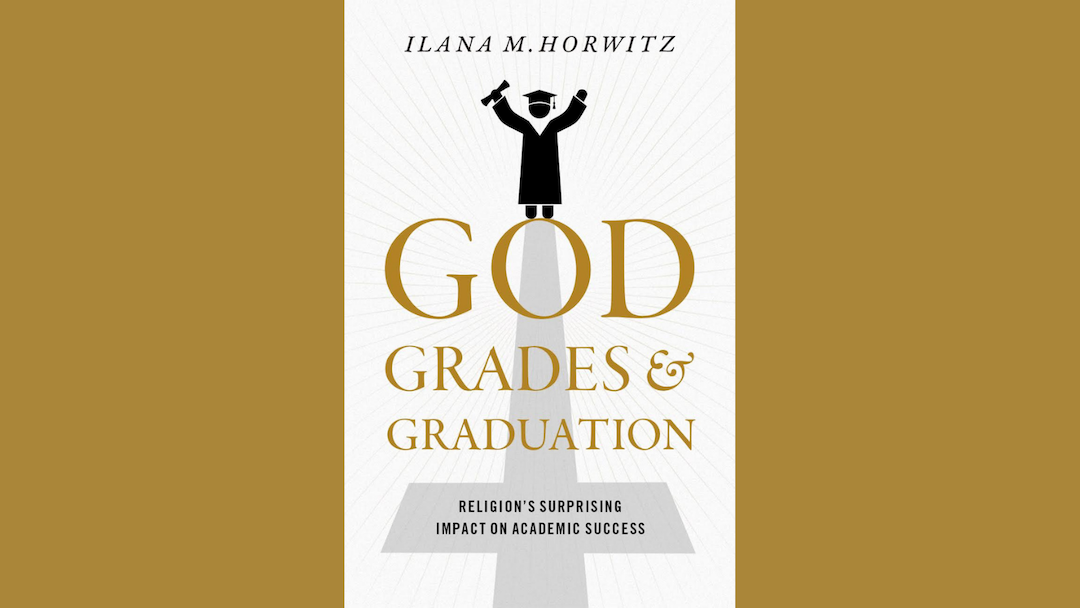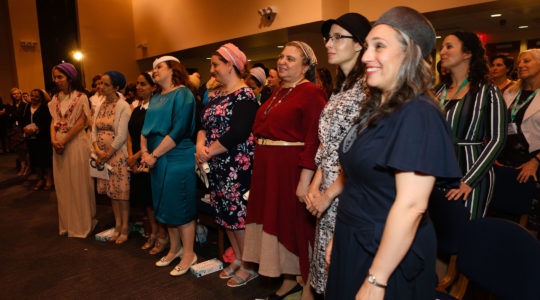(JTA) — In her new book, “God, Grades, and Graduation: Religion’s Surprising Impact on Academic Success,” sociologist Ilana Horwitz examines the ways a religious upbringing shape the academic lives of teens. In one important finding, the subject of her recent op-ed in the New York Times, she found that working-class teenage boys raised in strongly religious homes were twice as likely to earn bachelor’s degrees than boys who were not.
The same body of research also led her to a striking — if, to some, unsurprising — finding about Jewish women: girls raised in Jewish homes were 23 percentage points more likely to graduate college than girls with a non-Jewish upbringing, even controlling for their parents’ socioeconomic status. Jewish women also tend to graduate from much more selective colleges than their similarly situated non-Jewish peers.
Horwitz and her co-authors discuss the finding in “From Bat Mitzvah to the Bar: Religious Habitus, Self-Concept and Women’s Educational Outcomes,” a paper published in the American Sociological Review. They argue that elite higher education and graduate school are central to the “self-concept” of girls who grew up in Jewish homes. By contrast, girls raised by non-Jewish parents “tend to prioritize motherhood and have humbler employment aims,” they write.
Horwitz, an assistant professor of Jewish studies and sociology at Tulane University, based her research on the National Study of Youth and Religion to the National Student Clearinghouse, which followed 3,238 adolescents for 13 years.
Never miss a story. Sign up for JTA's Daily Briefing.
SUBSCRIBE HERE“The central finding of the paper is about girls raised by Jewish parents — not ‘Jewish girls,’ because this paper is a story about how families socialize their children into different religious subcultures and gender ideologies,” Horwitz told me. “We want to move away from the idea that Jews are inherently predisposed to educational success, to really thinking about a family socialization process.”
I recently spoke with Horwitz about what messages children pick up in Jewish homes, how she accounted for differences between religious and secular Jewish families and what policymakers and religious community leaders could learn from her research
Our conversation was edited and condensed for length and clarity.
JTA: Let’s start with definitions: What was your working definition of Judaism or Jewishness? Is it a religion? A culture? A race? Because if the different outcomes were about religion, then we know deeply religious, ultra-Orthodox families would have very different expectations for their young women.
Ilana Horwitz: We’re talking about it as an ethno-religious subculture. That is different from thinking about religion specifically as a set of practices or as a set of beliefs. In the paper we talk about “shared ideas, values, experiences, behaviors and symbols that are transmitted intergenerationally between members of different religious and ethno-religious groups.” Religious subcultures are not just shaped by theology, but also by factors like historical events, demographic patterns and political concerns.
So what happens in the home: What shapes the self-concept of Jewish girls that you talk about?
Sociologists have for a while talked about the fact that educational attainment is stratified by social class. Children who grow up in different social class groups develop different dispositions and different ways of thinking about themselves, the world and where education fits into that. Sociologists term this the “habitus.” Habitus basically refers to the air we breathe.
What we try to argue in the paper is that the habitus is not just informed by class. It is also informed by religious subculture, even if the families are not intensely religious. Kids are going to bar mitzvahs, to Hebrew school. Their family members are also Jewish, and the kids are in environments learning about different historical events. These different ways of thinking aren’t just reflective of their class position, but also about what Judaism teaches, what Judaism values, what people in the Jewish community do professionally. And for girls, there’s this extra dimension of gender egalitarianism that comes into play: Judaism is considered to be, and this may surprise people, the most gender egalitarian among religious traditions.
Girls specifically are not just sort of absorbing the Jewish religious subculture, but Jewish parents are raising their girls to believe that they can also have elite professions just as much as the boys. This is uncommon in the United States and other religious subcultures that espouse more traditional gender norms.
Jews are overrepresented in the upper middle class. Aren’t these just upper middle-class values?
The large scale nationally representative survey that we used allows us to control for different measures of socioeconomic status. After doing that, we still saw girls raised by Jewish parents doing statistically better in terms of their odds of graduating college and going into more selective colleges and that social class or socioeconomic status does not fully explain the story. If it did, the differences between Jewish girls and non-Jewish girls would not be statistically significant – and it was.
Then we looked at the interview data. The participants were followed over a 10-year period, starting in 2003 when they were 13-17 years old. This allows us to catch them as adolescents when they’re developing their self-concept. We matched girls raised by Jewish parents with girls raised by non-Jewish parents of comparable socioeconomic groups, and only looked at girls who identify as white because almost all the Jewish girls with the exception, I think, of one identify as white. And we found that their self-concepts were very different, and that is where we made this argument that it’s not just about social class, that habitus is also informed by their religious subcultures.
To give you an example, one of the girls in the study was not raised by Jewish parents. She grows up in a conservative Protestant home. Her mom was a schools superintendent, her dad was a representative to the Virginia House of Delegates. So on paper, she’s a very socioeconomically advantaged kid, and her parents have these highly prestigious careers. And yet she grew up with very traditional notions of gender, and her self-concept very much revolved around doing something altruistic. She ended up becoming a missionary. She did not want to go to an elite college. Having a prestigious career was not at all central to how she saw herself as a kid despite being an upper-class kid.
Can you give me a similar anecdote about Jewish girls – how their career goals and aspirations differed from the non-Jewish cohort?
We commonly saw in the narratives of the girls raised by Jewish parents that by the time they were teenagers, the idea of being a prominent career woman, of being in the spotlight, of fulfilling their life purpose through a prominent career, was central to their lives, and that motherhood was secondary. They all wanted to become mothers. But there was almost no woman raised by Jewish parents for whom that was the central goal of life.
They knew that to have these prominent careers they had to back things up: “If I want to be a politician or do sports management, I need to back up by going to graduate school. And to do that I need to go to a selective college, and so I’m going to start prepping really early on.” Girls with Jewish parents had incredibly sophisticated, elaborate views of how their educational journeys would unfold. Girls from non-Jewish homes also said they plan to go to college, but it was not something that they had given comprehensive thought to.
For the Jewish girls in the study, what stuck with them about Judaism from Hebrew school is that Judaism as a religion really values questioning and debate. This openness to new experiences is really important. They don’t just value education; they actually have learned to be willing to go outside of their comfort zone. This wasn’t prevalent among girls with non-Jewish parents.
Did your study look into levels of Jewish engagement – in other words, were there differences among Jews who were highly active in Jewish rituals, synagogue memberships or Jewish day school as opposed to less affiliated Jews?
The Jewish sample was not huge. Very few people who identified as Orthodox were in the sample. So most of whom we were looking at were Reform and Conservative Jews or at least those who back in 2003 still used those categories. This is a story about non-Orthodox families. And I feel like the story would look very different if I interviewed, especially, ultra-Orthodox families.

In her new book, “God, Grades, and Graduation: Religion’s Surprising Impact on Academic Success,” sociologist Ilana Horwitz examines the ways a religious upbringing shape the academic lives of teens. (Oxford University Press)
But within the sample, there wasn’t a ton of variation. It seemed that most of the kids were going to Hebrew school. When we looked at one Jewish parent versus two Jewish parents, kids growing up with two Jewish parents seemed to develop more of these messages in terms of the professions valued in the Jewish subculture. I remember one woman, for example, who had a Protestant mom and a Jewish dad. And early on in her life, she said, “my dad keeps talking to me about college and how I’m going to have this important career, but my mother doesn’t talk to me about that kind of stuff.” She actually decided she was much more interested in her mom’s church, and she got very embedded and socialized into the Protestant community. And she ended up having much more humbler visions of how her life would unfold.
That gets to the idea that habitus is the air we breathe. Kids who have Jewish parents have extended Jewish family and that air is just a little bit thicker.
To what degree does God, faith, spirituality or a higher power come into your studies, if at all at all?
It comes in very, very prominently for the [non-Jewish] kids in the book, but not for the Jewish girls. For the Jewish girls, belief plays a very, very tiny role, if any. It doesn’t really come up. What does come up is the social nature of the Jewish subculture. Even if you go to synagogue twice a year, you probably still go to some family bar and bat mitzvahs. You probably still interact with family members over a Passover seder. And during those social interactions, you learn pieces of Jewish history or information about the kinds of professions that your parents, grandparents, aunts and uncles had. They formulate your idea of what is in the Jewish subculture, even if it has nothing to do with God.
So the cliche I grew up with to explain Jewish educational and professional success was that we are the “people of the book” – that because we valued education and universal literacy we had the tools to succeed. But you seem hesitant to boil Jewish success down to “Jews value education.”
The idea of “valuing education” as the answer doesn’t recognize the structural, social and psychological factors that make it possible for people to actually be successful. Jews also have the resources to actually invest in education. They can afford college and graduate school for their children. Jewish boys did have to learn Jewish text. The whole “people of the book” thing was the history of the Jewish people. And that evolved in a way that made Jewish education work for the Jewish people, but there wasn’t anything inherent about the Jewish people that made that possible. It was a set of social, economic and historical factors that all have come together to land us where we are today, with Jews being among the most highly educated religious groups in America.
What we don’t want is to reify this idea that, “Oh, if Blacks and Latinos just valued education more, they’d be better off.” I want us to move away from that very simplistic and false idea to think about how different social, economic and psychological processes come together to make the valuing of education actually translate into educational advantage, and why other people who value education don’t get to reap the rewards.
So is there something policymakers can learn from this – if, for example, you want to close the achievement gap between various groups, or to help families encourage girls to succeed in ways that they sometimes don’t?
One takeaway is for religious subcultures to think about what kind of messages they’re sending to their girls about what they can do in the world, and how different religious teachings may be unintentionally promoting traditional gender norms that we don’t even recognize.
You said Jewish girls in the study don’t prioritize motherhood the way non-Jewish girls do. Does the egalitarian Jewish self-concept put unfair expectations on a daughter who may not share the same educational or career goals? And I know there are natalists and even anti-feminists in the Jewish community who bemoan that women’s professional aspirations diminish the value of motherhood.
Elsewhere I’ve written about the larger story of the link between educational attainment and reproductive rights. Yes, they are part of the same story. It is certainly more difficult to have more children while going to graduate school and having these prestigious careers. I’m going to put myself into this category as someone who had children later in life and had less time to devote to motherhood. So yes, there is a tension.
In the Jewish “continuity” discourse, this is a conflict. They want women to have more Jewish babies, and also want woman to be really successful and it’s hard to have both. Educational attainment and all these accomplishments that Jewish that women raised by Jewish parents are having comes with a tradeoff. I think we should celebrate women’s educational achievement. Others blame Jewish women for not having enough babies. That is viewing the same statistics, but from a different lens.
What was your own Jewish upbringing and what was expected of you from an early age?
I’m a bit of an anomaly. I moved here from Russia with my refusenik family at the end of 1988. I grew up with no Jewish exposure, but once we came to the U.S., I started Jewish day school and Jewish camp. My Jewish habitus came a little bit later in life. My habitus was very much like an immigrant mindset, which is just different. I had to go to a good school, I had to get a high-earning profession. I didn’t start out my career in academia. I started out in business. I went to college basically to get a high-paying job. My self-concept was rooted in having the means my parents didn’t have when they immigrated here.
Do you worry about the ways some people might co-opt your research, especially your findings on boys and religion — who might say that religious Christians and Jewish families have all the answers?
I was interviewed on the radio by the Archbishop of New York, Cardinal Timothy Dolan. And he really wanted me to go on record saying, “religion is good for learning.” And one of the things I talk about in my book is that religious kids may get better grades on average, and go on to complete more years of college, but it is because they are incredibly good rule followers and really conscientious, cooperative kids. But I want people to ask, are those the dispositions that we want our schools to reward? Just because you get better grades doesn’t mean that you are a happier person, or a more critical thinker. I tried to bring up these broader issues about why religion is valuable under particular conditions without saying, “religion is good for you,” or “religion is bad for you.”
JTA has documented Jewish history in real-time for over a century. Keep our journalism strong by joining us in supporting independent, award-winning reporting.







